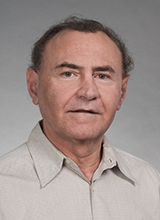
Personal Statement
I am a board certified psychiatrist and work at Fred Hutchinson Cancer Center. I am a Clinical Assistant Professor of Psychiatry and Behavioral Sciences at the University of Washington. I obtained a fellowship in consultation-liaison psychiatry, a specialty that focuses on providing psychiatric care for people with complex medical conditions. My primary clinical focus is people with cancer.
I love my work. Being ill is a vulnerable time and my goal is to ease suffering and provide a sense of connection and understanding for all I work with. I believe in working collaboratively with patients and families. We work together to identify what the goals of treatment are. I have expertise in diagnosis, psychopharmacology and psychotherapy and adapt my recommendations to best serve the goals of the person before me.
I am also passionate about education. I am the site director at Fred Hutch Cancer Center for our Psycho-oncology Fellowship Program. I supervise Cl fellows, addiction fellows, psychiatry residents and provide education to social workers and psychology trainees.
Personal Statement
As a geriatric psychiatrist, my professional interests revolve around improving the quality of lives for people with dementia, dementia-related psychiatric symptoms, and their caregivers. I provide direct clinical care as a psychiatrist at the VA Puget Sound, and I am involved in projects addressing dementia-related agitation. As the UW geriatric psychiatry fellowship director, I also recognize that training the next generation of geriatric psychiatrists is vital in order to meet the growing population needs in geriatrics.

Personal Statement
As a clinical neuropsychologist who has specialized in aging, I have over 20 years of experience in the field of geriatrics. My clinical work and research has been focused on the full continuum of cognitive aging – from neurodegenerative disease of varied etiologies to healthy brain aging into the 90s and beyond. I have been based at the VA Puget Health Care System since 2008. In this time, I have developed additional and complementary interests in the older adult Veteran who has PTSD, especially how this disorder can interfere with cognition and might contribute to decline and also in the area of reducing disparities in neuropsychological care for individuals who are transgender and gender diverse. Currently, I am the Associate Director for Education and Evaluation for the VISN 20 Geriatric Research Education and Clinical Center (GRECC) at VA Puget Sound. I am a Professor in the Department of Psychiatry. Provision of training for future geriatric care providers (MD, PhD, RN, SW, etc) is an important part of my personal mission. I also enjoy connecting with the older adult community through various events and at local senior centers.
Personal Statement
I am a geriatric psychiatrist and health services researcher. My research focuses on ways of improving mental health and well-being among older adults, especially those with dementia and their caregivers.

Personal Statement
Over the last 25 years, my work has focused on relationships between stress and health in several risk groups (spouse caregivers of persons with Alzheimer’s disease, medical students, psychiatric/medical outpatients/inpatients, air traffic controllers, and camp counselors). We have developed and/or revised measures of medical student stress, caregiver burden, patient anger/dyscontrol, process coping, appraisal, neuropsychological function and physician awareness of patient problems. These measures have been used by university researchers, insurance companies, pharmaceutical companies in clinical trials, prisons, nursing homes/long term care, rehabilitation facilities, and public health organizations. These psychosocial and behavioral measures have been shown to predict and be predicted by physiological and cognitive measures. We have also focused on moderators of such relationships, such as gender, personality, and co-morbidities. We have used primarily multicohort long-term studies that allow for interactions between exposures to stressors, hard-wired vulnerabilities, and more temporal resources. We attempted to identify mechanisms that can be potentially altered to have long-term public health significance in persons under chronic stress. I have also attempted to isolate groups that are at high risk for negative outcomes. In a perfect world, interventions should be used to help all persons who have deleterious responses to stress, but society cannot afford this. For this reason, the identification of high risk groups is imperative for maximizing the effect of interventions.
My research program’s long range goal is to better understand the mechanisms by which chronic stress translates into physical, mental, or cognitive health problems. We are examining caregivers of spouses with AD and demographically-similar spouse non-caregivers across time and assessing the degree to which elevated depression, stress hormones, inflammation, and insulin resistance in caregivers predict cognitive decline in caregivers relative to non-caregivers. We are also attempting to replicate our earlier work that showed that chronic stress and chronic disease moderate each other’s physiological risks. For example, physiological dysregulation that is specific to a disease (e.g., metabolic syndrome with CHD, blood pressure reactivity with hypertension, and immune function with cancer history, HbA1c with diabetes) is exacerbated in caregivers with a chronic disease relative to non-caregivers with a chronic disease, but no such differences occur in caregivers versus non-caregivers without a chronic disease. Finally, we are examining a large cohort of older adults sampled from various U.S. communities in order to assess the influence of life stressors on long term cognitive function and potential mediators of such changes.
Personal Statement
I am Co-Director of the VA VISN 20 (Northwest Network) Mental Illness Research, Education, and Clinical Center (MIRECC). I am also the Friends of Alzheimer’s Research Professor of Psychiatry and Behavioral Sciences at the University of Washington (UW) School of Medicine and am Associate Director of the UW Alzheimer’s Disease Research Center. My research over the past 30 years has addressed cognitive and behavioral problems and cerebrospinal fluid (CSF) biomarkers in neurodegenerative dementing disorders such as Alzheimer’s disease. More recently, my research has focused on combat trauma posttraumatic stress disorder and the clinical phenomenology as well as neuroimaging and CSF biomarkers of neurodegeneration in combat blast concussion mild traumatic brain injury and in Gulf War Veterans Illness. I continue to conduct single site as well as multi-site large scale studies of CSF biomarkers and pharmacological treatment trials for behavioral disorders and traumatic brain injury.
Summary of my research program:
Blast Concussion Mild Traumatic Brain Injury (mTBI)
Strategies: multimodal neuroimaging: structural and functional magnetic resonance imaging (diffusion tensor imaging [DTI], DTI tractography, macromolecular proton fraction mapping, resting state and task-based functional MRI; susceptibility-weighted imaging, FDG-positron emission tomography [PET]; cerebrospinal fluid and plasma biomarkers; genetic risk factors; clinical, neurocognitive and behavioral assessments,
Gulf War Veterans Illness (GWVI)
Strategies: multimodal neuroimaging and CSF and plasma biomarkers as described above, epigenetics, pain sensitivity testing and ability to activate endogenous opioid systems, and functional activity of paraoxonase I, the enzyme that metabolizes organophosphate insecticides.
Cerebrospinal Fluid and Plasma Biomarkers of Neurodegeneration Strategies: Bead-based multiplex assays using Luminex and Meso-Scale platforms, Quanterix ultra-sensitive platform, and broad-scale mass spectrometry for measurement of proteins, circulating RNAs, microRNAs in collaboration with VA/UW and Institute for Systems Biology investigators.
Pharmacologic Treatment of Disruptive Agitation in Alzheimer’s Disease (AD)
Strategies: Alzheimer’s Disease Cooperative Study multi-center randomized placebo-controlled trial of the alpha-1 adrenoreceptor antagonist, prazosin, for treatment of disruptive agitation in AD.

Personal Statement
I am a basic neuroscientist, a board-certified practicing psychiatrist, and an Assistant Professor of Psychiatry and Behavioral Sciences at the University of Washington Medical School. The goal of my research is to investigate the neural circuitry of cognitive, emotional and memory processing, particularly as it relates to the cerebellum, and illnesses affecting cerebellum including cognitive disorders, PTSD, TBI and dementia through the implementation of techniques in mouse behavioral genetics. In my clinical practice, I primarily see veterans with PTSD, mild cognitive impairment, and various forms of dementia in an outpatient clinic at the VAMC Puget Sound Geriatric Research, Education, and Clinical Center (GRECC) in Seattle. I have over 15 years of experience in basic science research with most of that time dedicated to the use of mouse models of neuropsychiatric disorders.
Throughout my training prior to and during graduate school, I gained background in many contemporary molecular and biochemical lab techniques, such as molecular cloning, protein biochemistry, protein crystal production, fluorometric measurement of protein kinetics, in vivo NMR spectroscopy, gene targeting, microarray genomics, immunohistochemistry, and mammalian cell culture. I have a foundation in mouse genetics, neural development, and behavior which I developed in Michael Georgieff’s lab by investigating the role of iron in developing pyramidal neurons of the mouse hippocampus. During graduate training, I also received cross-training in child psychological development. In graduate school, I developed two mouse models of nonanemic neuron specific iron deficiency: 1) a conditional knockout of the Slc11a2 gene, encoding the iron transporter DMT-1 in forebrain neurons, including hippocampal pyramidal neurons, and 2) a transgenic mouse with a reversibly inducible dominant negative (nonfunctional) form of the transferrin receptor expressed only in hippocampal pyramidal neurons. I utilized and implemented different versions of the Morris Water Maze to study learning deficits in these mouse models of perinatal brain iron deficiency, a condition that is often a consequence of diabetes during pregnancy.
During my residency training, I expanded my knowledge of neuropsychiatric disorders by directly evaluating and treating patients with neuropsychiatric disorders including PTSD, schizophrenia, Alzheimer’s disease, autism, major depression, substance abuse disorders, and personality disorders. I learned numerous pharmacological, neuromodulatory, and psychotherapeutic interventions and participated in the internally funded Neuroscience Research Track. I then received a NIMH career development award (K08) mentored by Larry Zweifel, Ph.D. In that position, I investigated interactions between catecholamines and the cerebellum in decision making, emotional and cognitive processing. In the 5 years I was in Dr. Zweifel’s lab, I learned many additional new techniques including use of viral vectors, in vivo electrophysiology, and several operant- and threat-based behaviors, and moved forward in my goal of becoming a physician scientist isolating important circuits underlying etiology of specific domains of behavioral function. This work culminated in my receiving an RO1 independent investigator award, without any gap in funding.
My current research utilizes mouse behavior, in vivo electrophysiological recordings, gene targeting, viral vectors, translational profiling, chemo- and optogenetic tools, site-specific intracranial viral vector injection, and protein chemistry. I am now forging my path as an independent investigator, and my primary goal is to understand cerebellar circuits as they relate to psychiatric and neurodegenerative illnesses and utilize this knowledge to inform and improve current and novel psychiatric illnesses, primarily in cognitive and emotional domains. As such, I am pursuing a multidisciplinary approach combining genetic, electrophysiological, pharmacological, and behavioral techniques.

Personal Statement
Over the past 20 years, my research has focused on the genetics of schizophrenia and neurodegenerative disorders, particularly on the use of clinical phenotyping and innovative genomic technologies to elucidate the complex genetic architecture underlying schizophrenia and Alzheimer’s disease (AD). I served as the Director of the Geriatric Research, Education, and Clinical Center (GRECC) at the VA Puget Sound Health (VAPS) from 2011-2022, in order to focus on my research on Alzheimer’s Disease and related disorders. My current research interests are two-pronged: 1) develop machine learning models in VA’s vast electronic health records in order to assign ADRD probability scores in older Black and White Veterans; and 2) use mobile health devices to promote early diagnosis of dementia with Lewy bodies. In In these capacities, I direct multidisciplinary efforts to better understand the biology, genetics, etiology, prevention, and treatment of these disorders, and I provide clinical expertise for the differential diagnosis of neurodegenerative disorders and treatment of behavioral disturbances in dementias.








